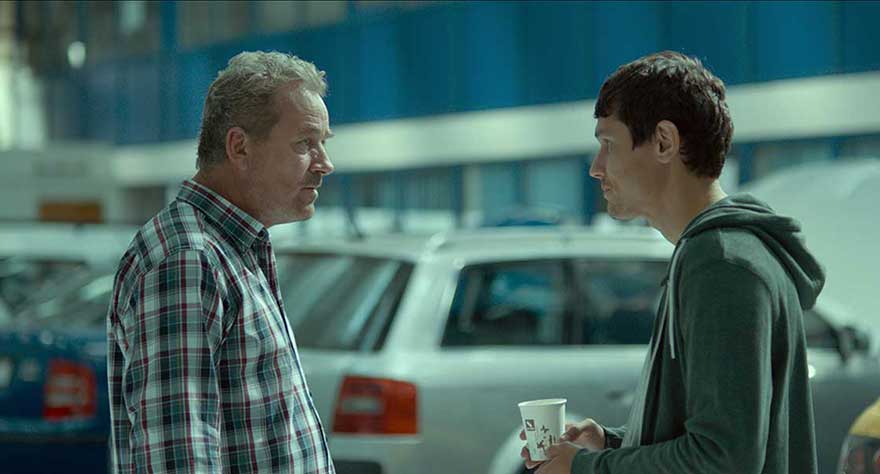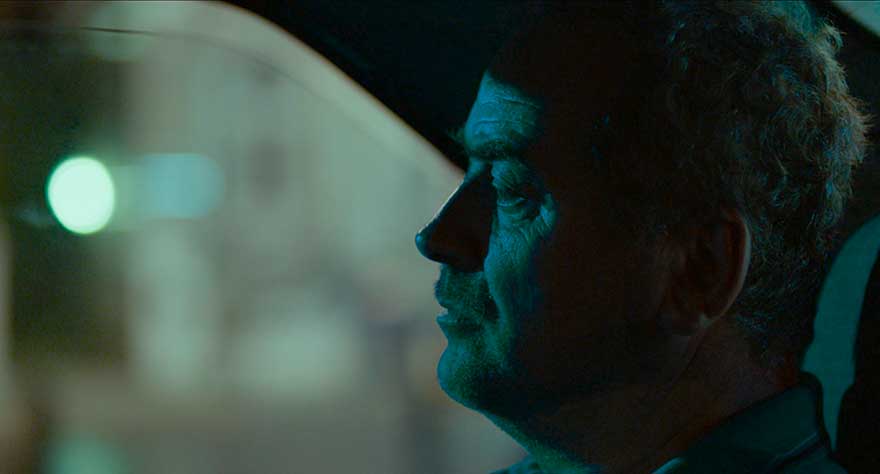Radu Muntean Talks ‘One Floor Below’ and Making Viewers Uncomfortable

Radu Muntean’s One Floor Below centres around Patrascu (Teodor Corban), a man who’s made a business out of navigating his way through government bureaucracy for citizens. When coming back to his apartment one day, he hears his downstairs neighbour Laura arguing with Vali (Iulian Postelnicu) in her apartment. Later that day, he learns that Laura has been found murdered in her apartment, but when the police come to question him, Patrascu doesn’t tell them about what he heard. It seems like an issue Patrascu just wants to go away altogether, but soon Vali starts befriending his wife and son, and Patrascu finds himself stuck in a volatile situation he can’t get out of.
Muntean’s film is a murder mystery that’s less about the murder itself and more about the reactions to it, letting viewers try to figure out what’s going on in each character’s head rather than concerning themselves over the specifics of the crime. It makes for a much more fascinating and rewarding film than its conventional plot would suggest, avoiding narrative concerns to explore character instead. Back at the 2015 Toronto International Film Festival, I sat down with director Radu Muntean to talk about the film.
One Floor Below opens Friday, January 22nd in Toronto, Ontario at the TIFF Bell Lightbox.
Where did the idea for One Floor Below come from?
I remembered this idea I had maybe 15 years ago or more. I read an article in a newspaper about someone who witnessed a murder. He was listening to a fight in neighbour’s apartment, he didn’t do anything, and then he heard there was a crime there. I was thinking about this, like if he did something at that moment [of the fight], maybe he could have stopped the killing or interrupted the fight. It was inside my head for some time, and then I met a guy who was actually the model for Patrascu. He has the same job as him, and I thought it might be interesting to mix a very in control character like Patrascu with this difficult situation you can’t easily control.
Your last film Tuesday After Christmas also deals with a character losing control, except in that film it’s because of an affair. What attracts you to throwing characters into these kinds of situations?
I’m attracted to putting myself, the character, and the viewer in an uncomfortable situation. What would you do when you’re in a position where Patrascu is? It’s not an easy task because you know he’s not a vicious guy. It’s something personal, somehow none of your business, although society wants you to react very promptly and share all the information that you have. But it’s not so easy. If you’re referring to my previous film, it would have been easier to have a very ugly wife, an aggressive and boring wife or whatever, but she’s as beautiful as the mistress and you have to choose. It’s very subjective.
Do you have sympathy for Patrascu?
I need to try and understand him. I’m not judging him at all. This is not the case. The case is to talk about the notions like conscience and morality. To question [them] in a very direct and sincere way.
It’s a murder mystery, but the mystery is about psychology and motivations.
The viewer has all the information that Patrascu has regarding the murder. We wanted Patrascu to have the 1% of doubt that he could hang on to, that this wasn’t the real killer. Towards the end of the film, he realises Vali is the real killer, but he also realises that he misjudged his actions until that moment.
These underlying aspects are left open to the viewer, but do you know the answers yourself when developing the film?
Yeah, of course. For me, it’s the only way. You have to talk to the actors, you have to make them understand their characters in order to make them organic with their characters. Otherwise, it’s just something glued on their own personalities, and you can see that. I think I was very precise in that I knew where I wanted to get with the film. At the same time, what you interpret as open is the viewer’s way to get to that point, which might be different from viewer to viewer.
I did find it very straightforward in terms of what happens, but it’s still a complex film.
Yes, these are the facts, but it’s not so easy to judge them! [Laughs]
Do you feel like what Patrascu has done, or didn’t do, is more of an isolated incident, or do you find this is representative of something larger or more societal?
It’s not a comment on society. Of course, a lot of people will think this, and I don’t mind it. They always link the films coming from Romania to social situations, political situations, the Communist era, the heritage of that, I don’t know. I didn’t want that because I’m Romanian, I live in that society and maybe I’m one of these guys. I don’t know, but I didn’t want to comment on it. And I think it can apply to a guy from Canada, from Korea…I think that, although you know what society wants from you, it’s not easy to apply it all the time. For me, Patrascu is thinking the police want him to give information, but if this guy killed this lady that he loved, most likely by accident, what can society do? What justice can be made in this kind of situation? It’s very tricky for me. To be honest, you have to question these things because otherwise they are just abstract. They’re just stamps saying you have to be this or you have to be that.

I felt like Patrascu working in this intense, bureaucratic job meant that he knew how much of a hassle it would be to him if he did provide the information and became a key witness.
Yeah, it’s very possible. It’s thinking about his own comfort and family, too. A lot of people in Cannes asked me about what’s Romanian in it, what’s the social commentary. I was thinking about this, and maybe they’re right. Some of the particularities of Patrascu as the male head of the family are in a lot of Romanians. Their ego is quite big. Maybe because of the Communist heritage, the head of the family is not allowed to have weaknesses. And I think this is the main reason he is not telling his wife. Forget about the police. He was listening maybe a little too much near the door, and he didn’t do anything. He doesn’t want to recognize this in front of his wife because he’s supposed to be the head of the family. Maybe that’s the thing. I don’t know if it’s only Romanian.
Tell me about the casting process for Teodor and Iulian.
I first chose Iulian because I knew him, I used to work with him before. I’m doing a lot of advertising in between films so I worked with him. I immediately thought of Iulian and I cast him after we did some tests. For Teodor, I was not so sure because I was initially thinking of a younger character, 40-something instead of 50-something, but he’s very transparent. You can feel what’s inside him even if he’s barely moving. He’s an intelligent actor, he can be very organic with the character and I needed this. He can be empathetic even with a very minimalistic way of acting, and even if you know very few things about the actor you somehow feel his inside.
Does your precision with the film’s form also apply to the actors, or are you more open to what they might want to bring to the performance?
Of course, I have the idea, but it’s not cartoons. They bring their own personality to the film. I want them to understand what I want from the character and I’m open to ideas, but at the same time I’m not changing a lot in the rehearsals. It’s a kind of process in layers, you put layer after layer until the final layer on the shooting. I discuss a lot with them but there’s almost no room for improvisation [during] shooting.
How much preparation went into pulling off the fight scene at the film’s climax?
It was the most difficult thing that we shot. We knew it had to be in one shot because we did the whole film like that, it has to be as real as you can [make], and you have to obtain this without a degree of danger. They could actually hit themselves very hard. We initially had a fight coordinator, but we fired him after two rehearsals because he had very clear idea of how they could pretend they’re fighting. We had a little bit of choreography of how things will take place. We rehearsed with 20% of the power involved in the fighting but having in mind that during shooting we have to use almost 100%, so things can change very easily. The first time we shot it, Iulian was hit in the head by Teo’s foot somehow, so I had to change the way I wanted to shoot a little bit. We did reshoot [the scene] and it was OK, but at the end of the shooting day, I was not completely happy. I wanted even more. It’s the peak of the film, it’s like the Sergio Leone showdown in my way, so it should be very convincing.
Did the rest of the shoot go smoothly given your rehearsal process?
Smoothly or not, when you have a 5-minute or 6-minute shot with 4 characters there’s no such thing as a perfect take. You have to make small compromises. Sometimes it’s for the best, and sometimes it surprises you with really nice things. It’s a very alive process. Sometimes take number 2, sometimes take 20, sometimes take 11, it’s a peak. You feel like you cannot get a better take than this. And if something is not working, the focus, the movement, one of the actors, it’s really bad because you cannot get better. You can obtain only less from that scene. So it’s very alive and, for me, it’s very stressful. Even if it’s not difficult in a logistic way, it was not a difficult shoot, this tension I accumulate on this shooting is really intense for me and the actors.
Do you feel like that tension during shooting might actually help the material?
Who knows? No, I don’t think so. There are situations where you don’t want the characters to be tense.
Your last four films including this one have been written by you and the same two co-writers (Alexandru Baciu and Razvan Radulescu).
I really enjoy working with them. We’re really good friends and I cannot see any reason of changing the team because we’re having a really good time working together. We discover a lot of things about ourselves, and it’s a really interesting and intense experience.
